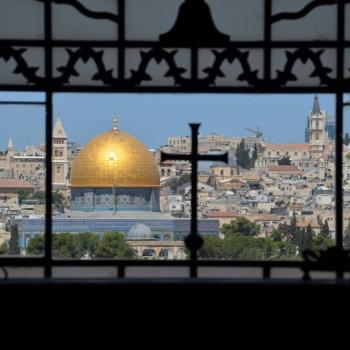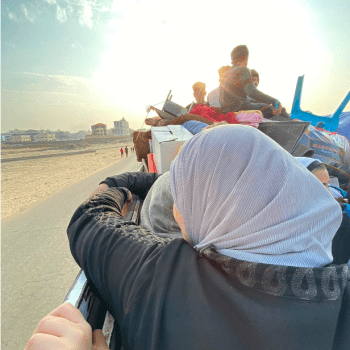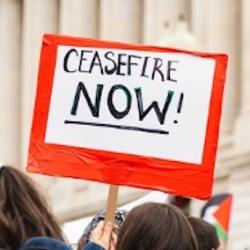“Jihad” is one of those misunderstood words in Islam – a word that makes many Christians tremble.
To the untrained ear, jihad is scary. But the purpose of these posts is to become trained.
I hope you’ll read this through and take some time to think about it. If you can, ask some actual Muslim people to explain jihad to you. Become smarter and more open-minded than you were yesterday at this time.
First, let me briefly mention that Islam is built on five pillars – foundational beliefs – including:
- Shahadah, or creed: “There is no god but God, and Mohammed is his prophet”
- Salah, or prayer: dawn, noon, afternoon, evening, and night
- Hajj, or pilgrimage: everyone who is able must visit Mecca once during their lifetime
- Zakat, or charity: everyone must practice charitable giving
- Ramadan: starting at the age of accountability, everyone who is able must participate in the Ramadan fast
You’re already familiar with Ramadan, the month of fasting (or if you missed those posts, read this from last week, or this from last year’s Ramadan series). We’ll be talking about the other pillars in due time.
Some schools of thought include a sixth pillar: jihad, or struggle – the believer’s internal struggle to live out her/his faith fully; the struggle to defend Islam. Pillar or no pillar, it is a loaded term that has been the source of profound misunderstandings and alienated the East from the West. And it’s an important part of Islam.
And so…let’s talk about jihad.
For many of us in the West, the word “jihad” conjures up pictures of ominous-looking bearded men with swords or machine guns, running around wildly and beheading Christians, or shouting “Allahu akbar” while piloting a plane into a skyscraper.
Indeed, at the time Islam was born, there were frequent battles between tribes. Today, rogue groups like ISIS perpetuate this stereotype.
If you were to ask one hundred actual Muslims whether 9/11 was a legitimate form of jihad, every last one of them would tell you it was not. They would explain that Islam is a religion of peace and those guys were brainwashed. Those one hundred Muslims know a lot more about Islam than any non-Muslim, so don’t let so-called Christian experts in Islam tell you otherwise.
I was living in Saudi Arabia on 9/11. I know whereof I speak. (That’s a post for another day.)
Ramadan as jihad (or not)
True jihad in Islam is mostly about the personal struggle to be faithful to God. In that sense, Ramadan may be seen as a form of jihad. If you’ve ever had to fast before a blood test or surgery (usually just a few hours), you can attest – fasting is a struggle!
Our Muslim sisters and brothers living among us contend with their flesh all month – fasting all day from food and drink, from smoking and cursing, and from intimacy. They push themselves to be productive at work (in most cases) in spite of their hunger and tiredness.
The guy I told you about last time who stayed home from work all month, rolling back and forth between the kitchen table and his bed – that guy was not jihad-ing. He was not putting his flesh to the test. The only thing tested during that month (besides my husband’s patience) was the elastic in the guy’s waistband.
The cook in each household needs an added layer of discipline, as she (or sometimes he) may spend the whole day in the kitchen! (My husband has taken to wearing a Covid mask when he cooks, so as not to accidentally lick his fingers.)
(If you are interested in learning about Islam, or if you question “business as usual” in Christianity – subscribe to my newsletter, and we can journey together!)

Ramadan at Pizza Hut
While living in Jeddah, Saudi Arabia, we decided once to go to the local Pizza Hut in Jeddah, Saudi Arabia for iftar. They had a pizza buffet, so obviously this was the ultimate Ramadan destination – or so we thought.
We got there early and grabbed a table. The restaurant was packed with hungry Saudis. When it was almost time to break the fast, waiters started bringing out pizzas of every kind – thin, thick, supreme, Hawaiian, pepperoni, meat-lovers (non-pork, of course)…
We waited patiently for the sound of the prayer call to indicate it was time to break the fast. But although we scurried up to the buffet table as fast as we could, the pizza was already gone. Everyone else had gone to the buffet before the prayer call and piled their plates with slices – I mean, people had the equivalent of an entire pizza pie on their plates, and there was nothing left for those of us who had waited. It was gross. And we were hungry. And isn’t that cheating?
Oh, sure, there was a platter of raw veggies, but who goes to Pizza Hut for the celery?
Eventually more pizzas arrived, and we had our turn. When we left perhaps an hour later, we looked around at the tables, now deserted, and saw tons of half-eaten slices left behind. It was tragic.
That also is not jihad. (I wished Jesus had been there to instruct the waiters to pick up twelve baskets of leftovers!)
Jihad, Christian-style
As Christians, we could stand to learn from our Muslim neighbors – especially those living here in the West, where no accommodations are made during Ramadan. They put in a full day, get by on little sleep, push through caffeine withdrawal. There might be a Muslim in your workplace today who is fasting, and you don’t even know it, because they’re not complaining. One of those people is sitting next to me now – he’s been up since 3:45 am, fasting since 5:30 am. He put in a nine-hour workday, and is answering some emails to pass the last hour and a half till iftar. That is jihad.
We Christians could stand to exercise our jihad muscles like that! I know when I see my dear hubby totally crushing it, I’m challenged and inspired.
Colossians 3:5 exhorts us:
Put to death, therefore, whatever belongs to your earthly nature.
Where do you go too easy on yourself? Where do you need to struggle against your flesh a little harder? Suit up – put on the armor of God (Ephesians 6), and get your jihad on!
Appendix:
Just for the record, here’s what the other kind of jihad (“defense of Islam”) is supposed to look like.
Islam sets down clear guidelines as to when war is ethically right, and clear guidelines as to how such a war should be conducted.
In brief, war is permitted:
- in self defense
- when other nations have attacked an Islamic state
- if another state is oppressing its own Muslims
War should be conducted:
- in a disciplined way
- so as to avoid injuring non-combatants
- with the minimum necessary force
- without anger
- with humane treatment towards prisoners of war
(NOTE: this is not what Saudi Arabia’s war with Yemen looks like. And BTW, I have plenty of complaints about Saudi Arabia, but it was my home for ten years, and I have many fond memories of my time there.)
(If you are energized by widening your perspective on faith, sign up for my free newsletter here!)
RELATED POSTS:
- Ramadan for Christians: then sings my soul, “subhanallah”
- Ramadan for Christians: mashallah, inshallah, and more
- Interfaith harmony: the kinship of Christians and Muslims
- Paradigm shift: the Parable of the Diaper
- Hate has no home in Christianity
FEATURED IMAGE: “Chicago pizza slice” by gtrwndr87 is marked with CC BY-NC-SA 2.0.













